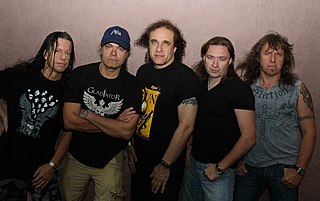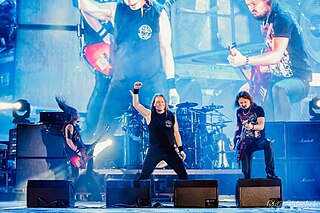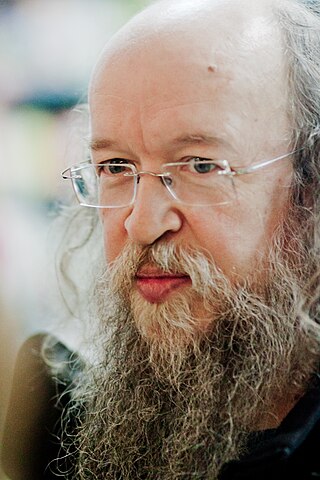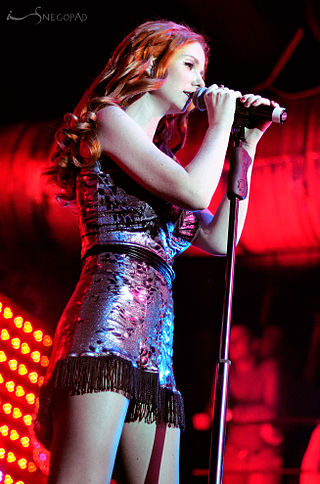
Mashina Vremeni is a Russian rock band founded in 1969. Mashina Vremeni was a pioneer of Soviet rock music and remains one of the oldest still-active rock bands in Russia. The band's music incorporates elements of classic rock, blues, and bard's song. Mashina Vremeni's best known members are Andrei Makarevich, Alexander Kutikov, and Evgeny Margulis (guitarist/songwriter).
Kino was a Soviet rock band formed in Leningrad in 1982, considered to be one of, if not the, greatest rock band in the history of Russian music. The band was co-founded and headed by Viktor Tsoi, who wrote the music and lyrics for almost all of the band's songs. Over the course of eight years, Kino released over 90 songs spanning over seven studio albums, as well as releasing a few compilations and live albums. The band's music was also widely circulated in the form of bootleg recordings through the underground magnitizdat distribution scene. Viktor Tsoi died in a car accident in 1990. Shortly after his passing, the band broke up after releasing their final album, consisting of songs that Tsoi and the group were working on in the months before his death.

Sergey Anatolyevich Kuryokhin was a Russian composer, pianist, music director, experimental artist, film actor and writer, based in St. Petersburg, Russia. Former keyboardist for the rock band Aquarium.

Aria is a Russian heavy metal band that was formed in 1985 in Moscow. Although it was not the first Soviet band to play heavy music, Aria was the first to break through to mainstream media and commercial success. According to several public polls, Aria ranks among top 10 most popular Russian rock bands. Their sound resembled that of NWOBHM bands, for which they were dubbed the "Russian Iron Maiden" in the media.

Kipelov is a Russian heavy metal band formed and led by former Aria vocalist Valery Kipelov.

Nachalnik Kamchatki is the third album of the Soviet rock band Kino. The name of the album is a play on the title of the 1967 Soviet film Chief of Chukotka.
Avtomaticheskie udovletvoriteli was a Soviet, and later Russian, punk band, formed in Leningrad in 1979. It is considered the first Russian punk band, and its founder, Andrei Panov, is sometimes referred to as "the first punk in the USSR".
Little Tragedies are a Russian language progressive rock, art rock and symphonic rock band from Russia. Arguably the most important progressive rock band in Russia.

Spitfire is a ska band formed in Saint Petersburg, Russia in 1993.

Yuri Dmitriyevich Kasparyan is a Russian and former Soviet musician best known for his time as the guitarist of the Soviet rock band Kino and as a member of Vyacheslav Butusov's group U-Piter.

Alkonost is a Russian epic folk metal band formed in Naberezhnye Chelny, Tatarstan, Russia in 1995.

Sergey Fyodorovich Letov, is a Russian musician and composer, known for his improvisational style. He is the founder of the recording label Pentagram. He has collaborated with numerous jazz, avant-garde, modern classical, rock and electronic music artists, including his younger brother Yegor Letov, composer Sergey Kuryokhin, and cult Soviet art punk band DK. Letov has written music for movies and plays, collaborating with Russian, Italian and Austrian theatres, the German non-profit cultural association Goethe-Institut, and the Moscow Institute of Journalism and Literature.

N.O.M. is a Soviet/Russian experimental rock band, formed in 1987 in Saint Petersburg, known for its mix of art rock, ska, folklore, classical influences and eccentric theatrical stage shows. N.O.M.'s national breakthrough came in the late 1980s when LenTV started playing the band's controversial videos. Short-time heroes of post-Perestroika alternative culture, N.O.M. have never been accepted neither by the massive pop/rock audiences, nor by the mainstream Russian media, but gathered a strong cult following. The band split into two in 1997, but the 2000s saw NOM-Zhir and NOM-Euro gradually reintegrating, the official reunion concert held on 20 April 2007 in the Saint Petersburg's "Port" Club.

Elena Sergeevna Katina, better known as Lena Katina, is a Russian musician who gained fame as one half of the pop/electronica duo t.A.T.u. She started her career at the age of eight, joining the Russian children's act Avenue, soon after that joining Neposedy. In 1999, producer Ivan Shapovalov chose Katina and Julia Volkova for his project t.A.T.u. The duo would later become Russia's most successful pop music act. The group produced several hits, including "All the Things She Said", "Not Gonna Get Us", and "All About Us". Their first single, "All the Things She Said", peaked at No. 1 in nineteen countries, including the UK, Russia, and Australia.

Yulia Olegovna Volkova, better known by the alternative spelling of Julia, is a Russian singer best known for being a member of the Russian girl group t.A.T.u., along with Lena Katina. Formed in Moscow, Russia by Ivan Shapovalov in March 1999, the group signed a record deal with Universal Music Russia, and eventually Universal's sub-label Interscope Records in 2001.
N.E.P. is a Russian rock band formed in 1988 in Saint Petersburg, then Leningrad, and widely credited as a legend of Russian rock music and classics of Russian rock, according to the biggest national mainstream rock radio.

Televizor is a Soviet/Russian gothic rock/industrial group formed in 1984 in Saint-Petersburg. Mikhail Borzykin is the lead singer and founder of group. They began to perform at the Leningrad Rock Club. They are noted for their strong views against authoritarianism in Russian politics, and have repeatedly denounced the actions of Vladimir Putin in their lyrics. At the time the group first formed, it was one of comparatively few political rock bands in Soviet Union.
Olga Gennadievna Glazova is a Russian singer-songwriter, composer and poet. She performed an academic repertoire of gusli and Russian folk songs in her own adaptation. Glazova is one of few performers who uses Russian folk instrument gusli and ancient harp to make repertoire prevailed by its own instrumental compositions and songs in Russian, English and other languages. Her first public performance took place in Pskov in 2001, during the international competition for young performers on folk multi-string instruments. By now she has been twice nominated for S. Kuryokhin award in the field of contemporary art – "Ethnomechanica – the best world music project", winner of about 30 international and national competitions of folk music, has published two solo albums of the harp music, and is engaged in restoration of lost equipment fingers playing the harp. Olga plays the custom 30-stringed harp crafted for her by A.Teplov. She cooperated with the notable russian acts such as "Affinage (band)", "Theodor Bastard", "Sergey Nikolaevich Starostin", "Aquarium (band)". In 2020 she has collaborated with the Art of Peace global project, composed and arranged by Mehran Alirezaei.

Andrei Vladimirovich Tropillo is a Soviet and Russian record producer, music publisher, sound engineer, founder of the label AnTrop ("АнТроп"), and rock musician.

Vsevolod (Seva) Yakovlevich Gakkel' is a Russian rock musician, who played cello in the band Aquarium. Gakkel founded the club TaMtAm and was the art director of the club Chinese Pilot Jao Da in Saint Petersburg.















